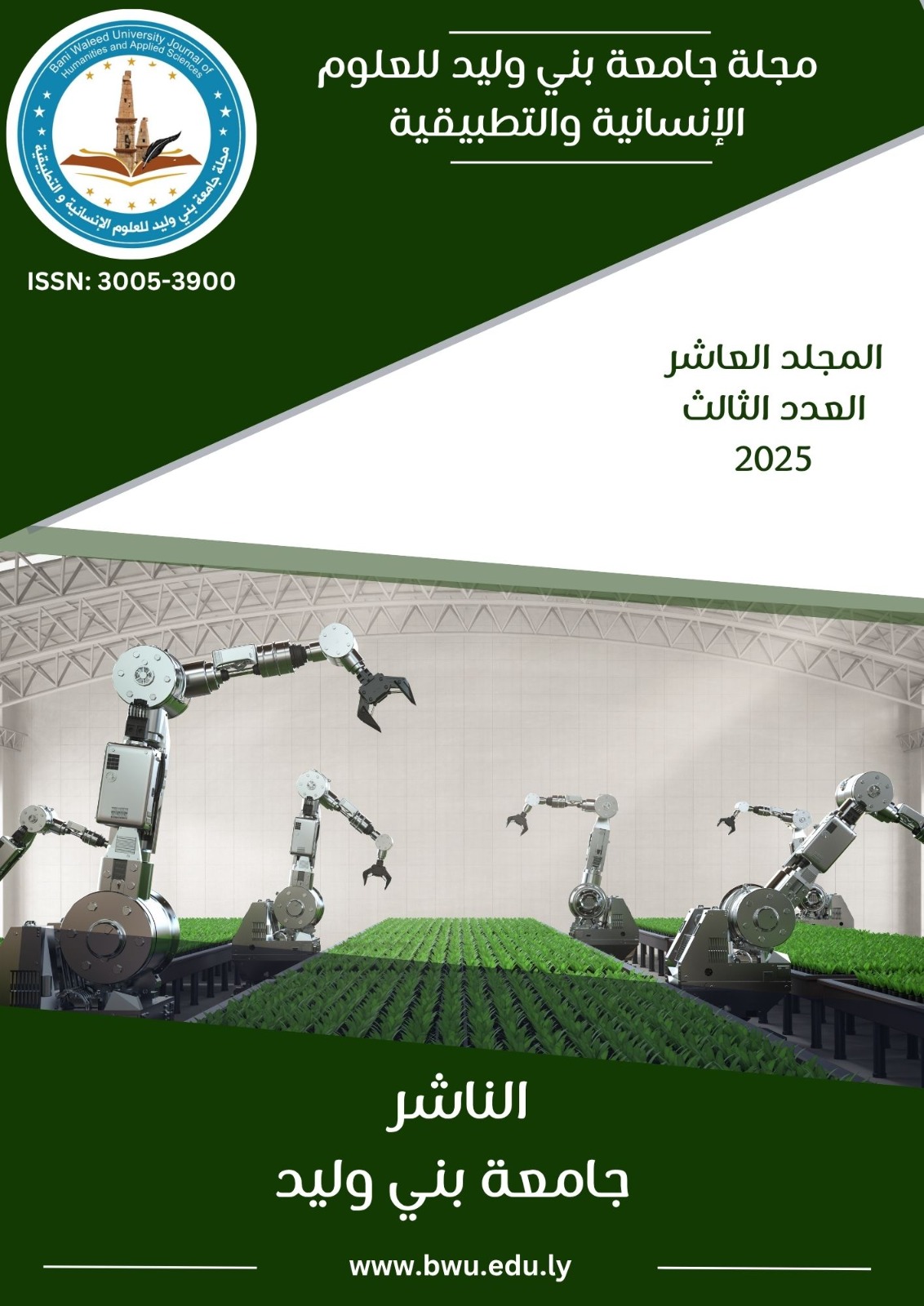Integrating the 5E Instructional Model with Vygotsky’s Sociocultural Theory: Vocabulary Learning through Story-Based Instruction to EFL Libyan Year One Students
DOI:
https://doi.org/10.58916/jhas.v10i3.857Keywords:
5E teaching model, sociocultural theory, story-based instruction, vocabulary learning, young language learnersAbstract
v
This study aims at investigating whether an intervention based on reading the story The Rainbow Fish aloud to students and formulating intervention lessons based on a combination of the 5E teaching model and the principles of Vygotsky’s sociocultural theory would enhance the vocabulary knowledge of one class of Year One students studying English at an Montessori House International School in Benghazi. The instrument of data collection was a test used as both a pre-test and post-test to measure the students’ vocabulary knowledge before the intervention and after. The quantitative results of this study revealed increased mean scores; moreover, paired sample t-test analysis further indicated that the effects of the intervention were statistically significant. Also, the correlation between the scores of both tests indicated that all students improved regardless of their vocabulary knowledge before the lessons. The results attained from this study highlight the effectiveness of using the 5E teaching model and sociocultural principles in teaching English to younger learners. This study concludes that using story-based teaching, social interaction among learners and active learning leads to vocabulary recall in younger language learners.
Downloads
References
Abasi, M., & Soori, A. (2014). Is storytelling effective in improving the English vocabulary
learning among Iranian children in kindergartens? International Journal of Education and
Literacy Studies, 2(3), 7–13 https://doi.org/10.7575/aiac.ijels.v.2n.3p.7
Abdulbaqi, D. (2024). The effect of 5Es model in developing fifth graders’ English vocabulary
learning and their motivation. Alustath Journal for Human and Social Sciences, 63(4), 77-
https://doi.org/10.36473/9pdbze23
Abdussalam, T. (2016). Analysis of variance in vocabulary learning strategies theory and practice:
A case study in Libya. Advances in Language and Literacy Studies, 7(3), 45-54.
Akar, S. S. (2020). Teaching vocabulary using short stories: Traditional versus digital mediums of
learning [Unpublished master’s thesis] Istanbul Sabahattin Zaim University.
Bybee, R. W. (1997). Achieving scientific literacy: From purposes to practices. Heinemann.
Bybee, R. W., & Landes, N. M. (1990). The 5E instructional model: A learning cycle approach for
inquiry-based science teaching. BSCS Journal, 2(4), 33–39.
Bybee, R. W., Taylor, J. A., Gardner, A., Van Scotter, P., Powell, J. C., Westbrook, A., & Landes,
N. (2006). The BSCS 5E instructional model: Origins and effectiveness. BSCS.
Dujardin, E., Ecalle, J., Auphan, P., Bailloud, N., & Magnan, A. (2023). Vocabulary and reading
comprehension: what are the links in 7- to 10 year-old children?. Scandinavian journal of
psychology, 64(5), 582–594. https://doi.org/10.1111/sjop.12912
Ellis, G., & Brewster, J. (2014). Tell it again! The storytelling handbook for primary English
language teachers (2nd ed.). British Council.
Farizawati (2016). Using storytelling for teaching vocabulary. English Education Journal, 7(2),
-259.
Hartati, S., & Ardila, M. (2020). Teaching English vocabulary by using fables storytelling to the
eighth-grade students of SMP Muhammadiyah 1 Palembang. English Community Journal,
(2), 133–143.
Klaewham, K., Yimwilai, S., & Chaya, W. (2017, April). Enhancing vocabulary learning by using
the story-based instruction [Paper presented]. The Asian Conference on Arts & Humanities
, Japan.
Laufer, B., & Nation, P. (1999). Vocabulary size and use: Lexical richness in L2 written
production. Applied Linguistics, 20(1), 1-21.
Lee, J. (2011). Size Matters: Early Vocabulary as a Predictor of Language and Literacy
Competence. Applied Psycholinguistics, 32(1), 69-92.
https://doi.org/10.1017/S0142716410000299
Lessard-Clouston, M. (1994). Challenging student approaches to ESL vocabulary development.
TESL Canada Journal, 12(1), 69-80.
Aljadi, A. M. (2025). The Impact of Educational Materials on Student Motivation in Reading
Lessons: A Case Study in Libyan Schools. Bani Waleed University Journal of Humanities
and Applied Sciences, 10(1), 526-537
Lipsey, M. W., Puzio, K., Yun, C., Hebert, M. A., Steinka-Fry, K., Cole, M. W., Roberts, M.,
Anthony, K. S., & Busick, M. D. (2012). Translating the statistical representation of the
effects of education interventions into more readily interpretable forms (NCSER 2013-
. National Center for Special Education Research.
Louka, E. B. (2020). Investigation of the current strategies of teaching vocabulary to young
learners. [Unpublished master’s thesis]. University of Zawia.
Melgarejo, T. F. V., Atanacio, L. M. M., Leandro, A. I. C., Faustino, L. K. B., Rivarola, M. M. C.,
López, J. R. A., & Chavez, J. T. G. (2024). The 5E instructional model in the meaningful
learning of science and technology. Frontiers in Education, 9, Article 1435530.
https://doi.org/10.3389/feduc.2024.1435530
Mohamed, G. M. (2017). Investigating some techniques used by Libyan EFL teachers to teach
vocabulary to Libyan primary school students in Sabha city. [Unpublished undergraduate
thesis] University of Sebha.
Pfister, M. (1999). The Rainbow Fish (J. A. James, Trans.). NorthSouth Books. (Original work
published 1992)
Rivers, W. M., & Nunan, D. (1991). The language teaching matrix. Cambridge University Press.
Saville-Troike, M. (2012). Introducing Second Language Acquisition (2nd ed.). Cambridge
University Press.
Schmitt, N. (2010). Researching Vocabulary: A Vocabulary Research Manual. University of
Nottingham.
Alfaqi, I. M. A., & Alkorbow, A. H. S. (2025). The Role of Cultural Awareness in Successful
EFL Communication. Bani Waleed University Journal of Humanities and Applied
Sciences, 10(1), 394-411.
Septiana, N. I. (2024). The influence of using 5E learning cycle model towards students’ reading
comprehension of the eighth grade at SMPN 5 Bandar Lampung in the academic year 2023.
[Unpublished undergraduate thesis]. State Islamic University Raden Intan Lampung.
Soleimani, H., & Akbari, M. (2013). The effect of storytelling on children's learning English
Vocabulary: A case in Iran. International Research Journal of Applied and Basic Sciences,
(11), 4005–4014. Retrieved from http://www.irjabs.com
Spencer, T. D., Kirby, M. S., & Petersen, D. B. (2024). Vocabulary instruction embedded in
narrative intervention: A repeated acquisition design study with first graders at risk of
language-based reading difficulty. American Journal of Speech-Language Pathology,
(1), 135-152. https://doi.org/10.1044/2023_AJSLP-23-00004









